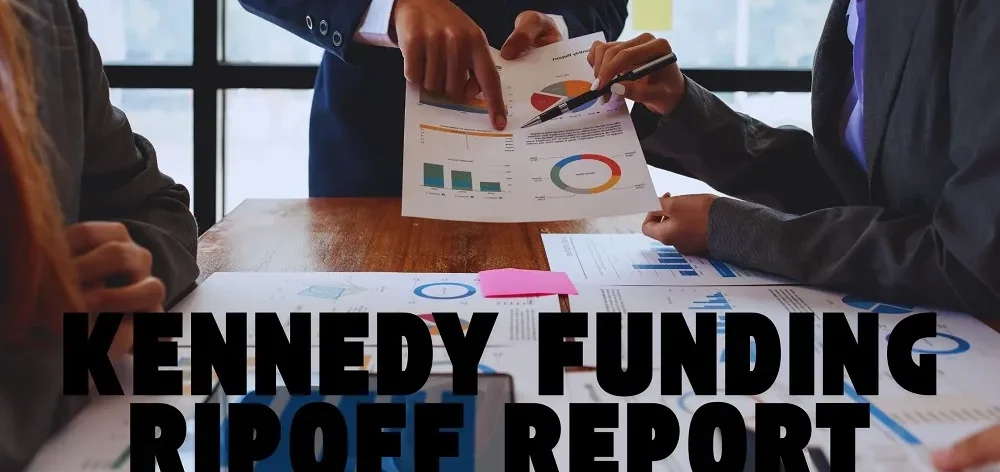After a long time, the term Kennedy Funding Ripoff Report has gained significant online presence, often associated with negative surveys and complaints approximately Kennedy Financing, a commercial real domain loan specialist. These reports have sparked discussions online about the veracity of the claims, the company’s operational strategy and whether the assurances are substantial or exaggerated. In this article, we’ll investigate what’s in the Kennedy Funding Ripoff Report envelope, look at the claims made by clients, assess the validity of these claims, and give a consistent perspective on whether the Kennedy subsidy merits negative consideration.
What is Kennedy Funding?
Before jumping into the nitty gritty of Kennedy Funding Ripoff Report, it’s important to know what Kennedy financing is and the administrations it offers. Founded in the early 1990s, Kennedy Subsidizing is a private, coordinating bank specializing in providing real estate financing. Based on unused shirts, the company targets commercial real estate speculators who need large-scale credit for property acquisition, refinancing and improvements. Unlike conventional banks, which have strict requirements for lending, Kennedy financing offers advances to borrowers who may face problems getting financing through traditional means. This makes the company a notable player in the elective lending space.
Kennedy Funding’s essential offering point is its ability to rapidly advance progress. The company is known for its adaptable advance structure and willingness to work with borrowers who want to get capital quickly. Company lines of credit typically have higher prime rates than conventional bank financing, reflecting the higher risk associated with lending to people or materials with limitations on other financing options.
What is the Kennedy Funding Ripoff Report?
A “sham report” is an online platform where buyers can file complaints and surveys about companies they receive that are believed to be untrustworthy, illegal, or inappropriate. The location allows people to share their encounters and many of these reports center on money related administrations, actual wills and loan business companies. In Kennedy Subsidies, the term Kennedy Funding Ripoff Report mostly refers to complaints from borrowers who have had negative encounters with the company.
These reports vary in their topics of interest but mostly include complaints of long interest rates, tricky trade deals, poor client benefits and unfavorable credit terms. For some, these negative encounters have led to claims of financial hardship or misfortune, making Kennedy Funding Ripoff Report a point of contention among those addressing the company’s authenticity and fairness.
Common Claims in the Kennedy Funding Ripoff Report
To survey the validity of Kennedy Funding Ripoff Report, it is important to look at the most common complaints made by borrowers. Understanding the nature of these complaints can shed light on the supposed reasons behind the negative reviews.
Excessive curiosity rate:
One of the most visited reactions highlighted at Kennedy Funding Ripoff Report is the long plot rate that the company charges on its credits. Borrowers have detailed that interest rates for commercial credits at Kennedy Funding are much higher than those advertised by conventional banks. Where private loan specialists like Kennedy Subsidy routinely charge higher rates because they take advantage of the opportunity to lend to borrowers who might not qualify for conventional financing, the soak rate can end up being an overwhelming burden for some consumers.
Some borrowers feel that they have not satisfactorily added to the nearly full scope of the interest rate or the toll of the loan over its lifetime. In some cases, long rates are not clearly disclosed, driving to feelings of frustration and confusion. In any case, it is important to note that most of the budget literate, calculating the Kennedy subsidy, is legally committed to unveil the interesting rates and conditions within some time of the recent advance finalization.
Aggressive Credit Terms:
Another big complaint of Kennedy Funding Ripoff Report has to do with forced advance terms. Some clients elaborated that advance understandings were organized with short repayment periods and long costs, which made it troublesome to fulfill financial commitments. These stringent terms often result in borrowers struggling to keep up with installments, and some have blamed companies for being too quick to take legal action when installments are missed. These strong terms are routinely submitted to the fact that Kennedy negotiates primarily with high-risk borrowers, who are often looking for quick cash to fund complex genuine will projects.
For borrowers, the short-term nature of these advances can be particularly challenging, as it requires them to make full repayments spread over a generally short period of time, which can lead to financial stress. In many cases, this quick repayment plan may not align with the cash flow cycle of commercial real estate ventures, where it may take longer to launch a facility. When borrowers are unable to meet these terms, it can lead to defaults, dispositions and legal complications.
Poor customer service:
Customer service complaints are another recurring theme at Kennedy Funding Ripoff Report. Many borrowers reported frustration with the company’s level of communication and responsiveness. According to some reports, Kennedy Funding’s agents were difficult to reach, slow to respond to requests, and sometimes unprofessional in their intuition with clients. This need for client bolster led to frustration among those who felt that their concerns and questions were not adequately addressed.
Customer convenience is a fundamental angle of the lending encounter, especially when handling complex commercial credits. When problems arise, borrowers rely on their loan specialist to provide convenient and supportive energy. Poor client benefits can exacerbate problems, leading to a general negative involvement for borrowers.
Deceptive Trade Practices:
Some Kennedy Funding Ripoff Report complaints allege the company locked in misleading trades, cheated borrowers around advance terms, made guarantees that weren’t satisfied, or came up short on disclosing basic data about costs and charges. Clients claim they rushed to mark the deal without fully understanding the credit ascension response. In some cases, borrowers complain that they were not fully educated about all the costs, such as preparation costs, early closing penalties, or other charges that increase the loan amount.
Fraudulent hones, if they are occurring without any doubt, can be a significant problem for the company. Simplicity is important in any lending exchange, and borrowers have the right to have it in the full terms of the bargain by recently marking a deal. However, it is important to recognize that financial items such as the Kennedy Subsidy Advertisement can be complex and borrowers can sometimes misinterpret or confuse terms, especially if they are not familiar with the jargon used in credit agreements.
Default and Foreclosure:
Some of Kennedy Funding Ripoff Report’s complaints include cases where borrowers defaulted on their credit and faced settlement procedures. As a private lender, Kennedy Financing regularly deals with high-risk borrowers who may have a history of credit challenges or are limited by conventional financing. In such cases, the probability of default is intrinsically high. However, the stringent nature of Kennedy Funding’s credit terms may contribute to defaults, as borrowers may not be able to meet repayment plans or cover lengthy transaction charges.
When borrowers miss installments or default on their advances, Kennedy subsidies can quickly trigger the abandonment process, with little room for adjustment now and then. Borrowers who are unable to meet credit conditions may find themselves in critical budget straits, driving a sense of unsustainable behavior. In any case, it is important to remember that the terms of the advance understanding were probably agreed to by the borrower at the beginning of the credit, if indeed they currently find it difficult to meet those conditions.
Assessing the Validity of the Kennedy Funding Ripoff Report Claims
Basically it is important to evaluate the Kennedy Funding Ripoff Report complaint. As with any online audit phase, sham reports tend to speak in the voice of frustrated clients, while those who take the time to share their input in positive encounters are less likely. Hence, negative reports may not speak to a broader view of the company’s general performance.
Nature of Sham Report:
Ripoff reports are central to negative encounters, so it must be considered that the preponderance of negative audits does not necessarily indicate that the company is engaged in fraudulent activities. Individuals who have had a positive encounter with a company and at large do not feel compelled to post surveys. In this manner, these reports may present a skewed view of Kennedy Funding’s operations. It is also important to consider the nature of complaints, as they may arise from wrong assumptions or unlikely aspirations of borrowers.
Complications of real domain financing:
Commercial real domain financing, especially for large-scale enterprises, is inherently complex. The terms of these credits can make it difficult to get, especially for borrowers who are not involved in the industry. Longer interest rates and stronger credit terms reflect the regularly expanding opportunities that Kennedy Financing takes in lending to borrowers who may not qualify for conventional financing. In some cases, borrowers thought little of the financial commitments involved in commercial credit, leading to dissatisfaction and budget pressures down the line.
Transparency and Disclosure:
A key consideration in surveying the validity of a Kennedy Funding Ripoff Report complaint is whether the credit terms were clearly disclosed. If Kennedy Subsidy is straightforward around its costs, interest rates and repayment plans, complaints may come from borrowers who have misunderstood or neglected credit approval interests. On the other hand, if critical terms are omitted or distorted, the company appears to face real reputational damage.
Customer Bolster and Company Feedback:
A company’s response to client complaints is another basic illustration of assessing the validity of claims. Kennedy Funding’s notoriety within the industry can be affected by how the company handles negative input and resolves complaints. Companies that lock in with clients, resolve issues, and show an interest in advancing their integrity are more likely to overcome negative recognition. Regardless, the lack of responsiveness or frustration in addressing client concerns appears to contribute to the company’s negative image.
Conclusion
Kennedy Funding Ripoff Report reflects the encounters of a segment of borrowers who have had negative experiences with the company. While allegations about high prime rates, forced credit terms and poor client benefits are cause for considerable concern, it is important to evaluate these claims in the broader setting of the commercial real estate lending industry. Kennedy Subsidy operates in a special showcase, advertising high-risk credit to borrowers who may not qualify for conventional financing. As such, higher interest rates and stronger advance terms reflect the risk involved.
While some complaints may be honest to goodness, others may stem from flaws or improbable desires. Prospective borrowers should approach any loan agreement with full consideration of the terms, costs, and risks. It is fundamental to check the fine print, get a financial commitment and seek expert advice if needed. By doing so, borrowers can make educated choices and avoid the negative encounters that some have detailed in Kennedy Funding Ripoff Report.
Read More latest Posts
 Written by
John Smith
Written by
John Smith





